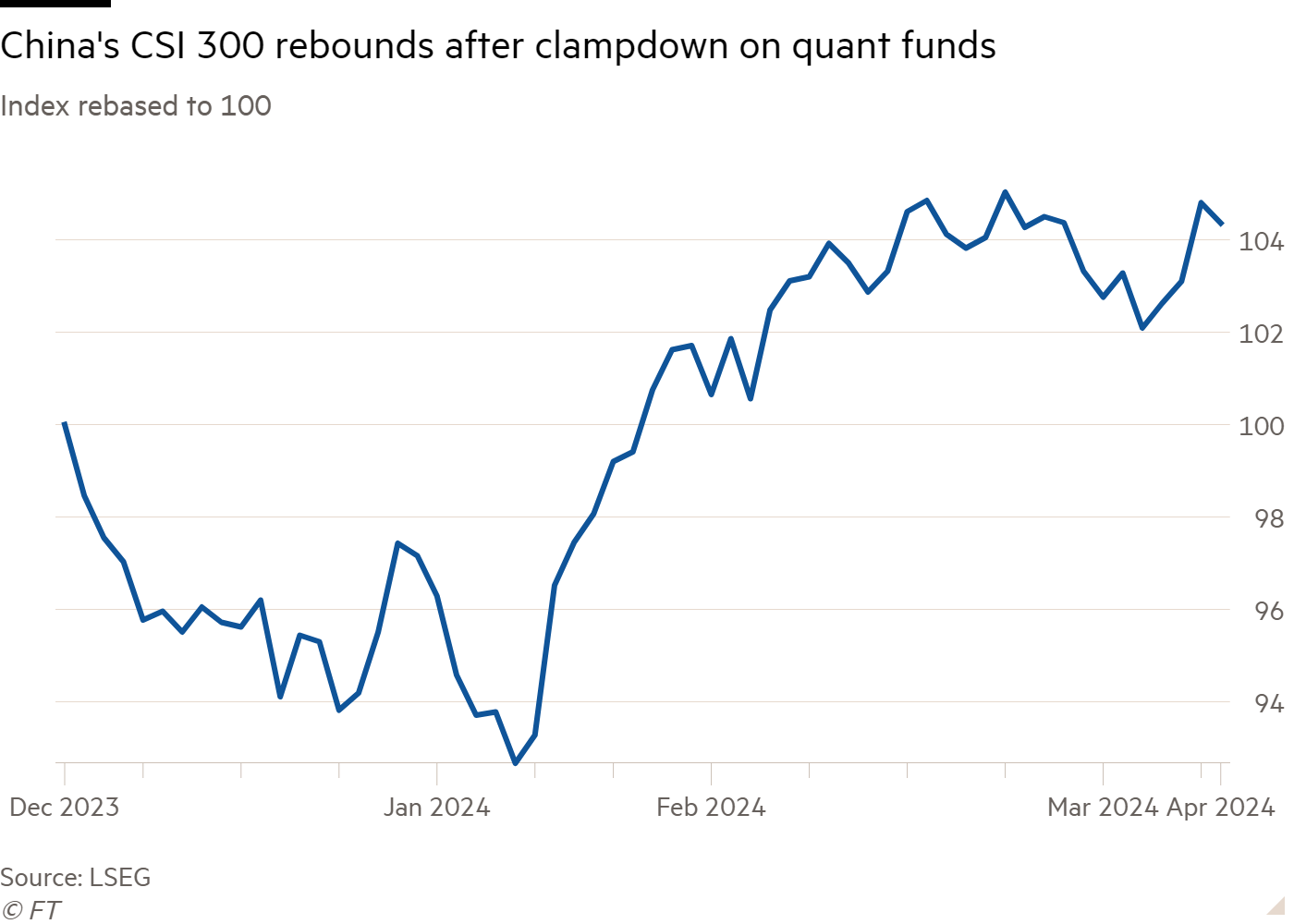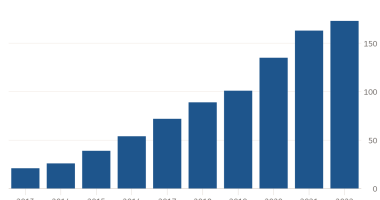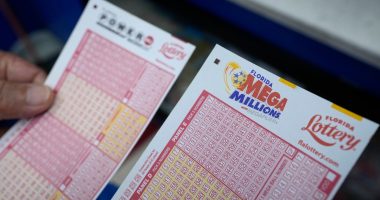Unlock the Editor’s Digest for free
Roula Khalaf, Editor of the FT, selects her favourite stories in this weekly newsletter.
Computer-driven traders in China’s $250bn quant sector are overhauling their strategies in response to a regulatory crackdown that threatens to curb industry growth and returns after a decade of gains.
Funds including Lingjun Investment and High-Flyer Capital Management, which each managed Rmb60bn ($8.3bn) at their peak, are changing their complex trading algorithms to comply with restrictions on speculative bets as Beijing tightens its grip on Chinese markets following a heavy sell-off.
Their move comes after authorities blamed quants’ rapid-fire trading patterns for exacerbating the stock market’s slump in January, when the benchmark CSI 300 index dropped 6 per cent to a five-year low.
A regulatory focus on “fairness and justice” could hit an industry that has grown rapidly in the last decade, but has been frequently criticised for exploiting less informed and less technologically advanced retail investors.
Some executives expect that curbs to speculative bets will mean the end of outsized returns and ever-rising assets under management.
“Quants in general make money by exploiting market anomalies,” said Wang Qi, chief investment officer for wealth management at UOB Kay Hian in Hong Kong. “What we need more of [in the Chinese stock market] is better corporate governance, confidence, and long-term investing,” Wang said. “I just don’t see how quants can play a role here.”
In the short term, many have had to make immediate fixes to their trading strategies and trading algorithms.
The China Securities Regulatory Commission took the view that the role some quant funds played contributed to a further erosion of investor confidence, according to one person familiar with its thinking. CSRC did not immediately respond to a request for comment. Wu Qing, the new head of CSRC, last month emphasised that “regulators must pay special attention to fairness issues.”

Even so, the CSRC ordered that all market activity by funds that rely on complex automated trading strategies would be closely scrutinised under a new monitoring scheme.
Regulators required quant managers to share the algorithms underpinning newly set up funds, and limited the quantity of shares they can sell in a short period. The agency has also restricted the amount of money investors can borrow from brokers to magnify their bets, via derivatives known as “direct market access” swaps.
Lingjun was named by authorities, and banned from the market for three days for its rapid sale of $356mn worth of shares in one minute in February. The fund later apologised for causing a negative impact on the market. The company is now tweaking its model so it can smooth out daily stock sales, while High-Flyer is curbing its use of direct market access derivatives, the people said.
For some the moves are likely to have a cooling effect on the industry. “It’s a typical moment of ‘killing chickens to scare monkeys’,” said one of the Beijing-based quant fund managers. “If some of the leading quant funds can’t avoid being punished for quick sales in one day or one minute, what do you think the rest [of the] funds will do next?”
Authorities have in particular focused on the leverage on offer through direct market access, a crucial route for quantitative traders. In the last three years the industry doubled in size and profited hugely last year from leveraged strategies that involved betting on microcap stocks and hedging their positions with index futures.
More than 1,300 China quants recorded gains in 2023, according to data compiled by Li Ming, researcher at Changjiang Futures. Of these, the 227 that traded the CSI1000 index — composed of Shanghai and Shenzhen-listed small cap stocks — reported an average annual return of 8.57 per cent. The benchmark large-cap CSI 300 lost 11.4 per cent last year.
But this strategy was wrongfooted in February, when the China deployed state-run funds and financial institutions — the so-called “national team” — to buy exchange traded funds that tracked large cap stocks and stabilise the market.
The size of purchases sucked liquidity from the market, and rise in the large cap market lifted the smaller stock index, leaving some funds on the end of heavy losses. Some quant funds lost as much as 30 per cent in February and were on the verge of closure, according to Changjiang Futures.
Many quants had to intervene manually in their systems and sell microcap stocks while markets were closed for the Chinese lunar new year holiday, people familiar with the move said — a rare step in the quant world where systems are normally allowed to carry on trading through different market conditions.
But this intervention in itself exacerbated market volatility, leading the benchmark CSI300 to slide heavily on the first morning session when it reopened.
Already the CSRC’s moves have begun to have some effect. Many of China’s under-pressure quant funds have stemmed losses, but the size of assets managed by the sector has been shrunk by performance losses and redemptions from institutional investors since February, according to Yu Jing and Zhang Jianhui, analysts at Sinolink Securities.
Huang Simindi, vice-president of quant fund Yanfu Investments, told a recent online roadshow to investors that the market was now less competitive and less crowded after a sharp fall in leveraged positions.
For others it is time to toe the line on authorities’ version of a level playing field.
“Our quant team was not sensitive to sentiments, they prioritised alpha at the expense of market stability, which concerned regulators the most,” said an executive of the leading quant fund that was among the managers to rotate its portfolio in February. “Now the lesson is learned and we shall all weather difficulties together.”
Read More: World News | Entertainment News | Celeb News
FT










